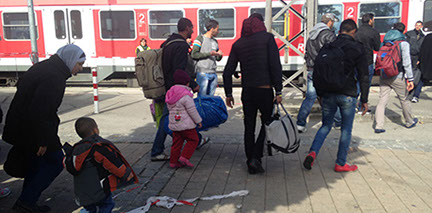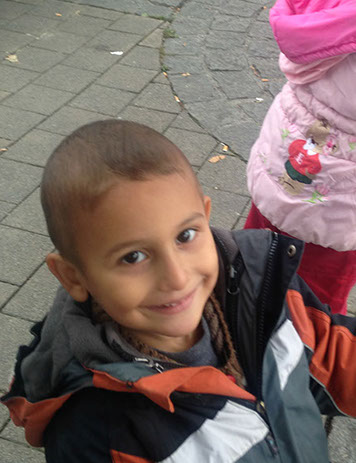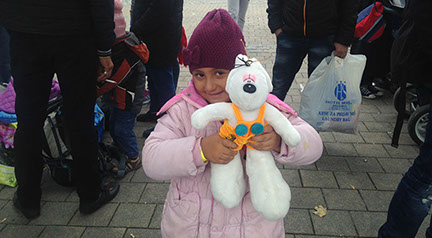The Full Distance
At the boarding line for the train to their destination in Germany, travelers make plans: they want to learn German and enroll their children in school.
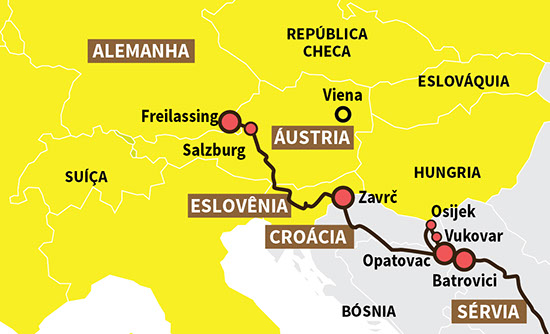
At least seven officers watch the main gate of the camp this morning, September 28. It's a cloudy autumn day, with a 6°C (43°F) temperature at dawn. About 1,200 migrants are waiting to register their names in order to enter the country.
At 10:00 am, while I keep looking for information outside the camp, a refugee couple with a baby in their arms comes near. They want to buy warmer clothes in a shop next to the camp. Before they can manage that, they are stopped short on the stairs of the store.
“You people are illegal, we have to register you,” says a police officer.
“But we don't want to stay in Germany. We want to go to Norway,” answers the family’s father.
“It's not your decision where you will stay. Here in Germany we do things step by step. You have to register.”
“We'll just go to the store first.”
“This is no time to shop,” the police officer denies their request and takes the family back to the camp.
The harsh tone signals the growing restrictions imposed by Germany amid the flow of migrants. With Chancellor Angela Merkel announcing the expectation of taking in 800,000 refugees by the end of 2015, declaring her happiness that Germany had "become a country that many people abroad associate with hope," the overflow has forced a change of plans. On September 13, when 13,000 people arrived in Munich in a single day and overwhelmed the city's capacity to welcome refugees, the country announced it would be enforcing border controls. By doing this, Germany has been temporarily suspended from the Schengen Treaty, which allows free movement between most EU countries.
Now, any person entering Germany must be registered, a process that can keep newcomers for up to two days in border shelters. After 12:00 pm, a line begins to form in the camp. Part of the group will be transported on a bus directly to Bavarian cities, while others will be taken to the train station
Mohammad, the little one, reappears in his father's arms with the same brown sweater he had in Greece. Tala wears a new red jumpsuit over the striped sweater that she wore in Athens. They are dressed, thanks to the solidarity of strangers, in clothes donated along their way. The police won't let me approach the family, nor can I have any official confirmation about their destination. But an officer is moved by the story and tells me that the family is being taken to the train station.
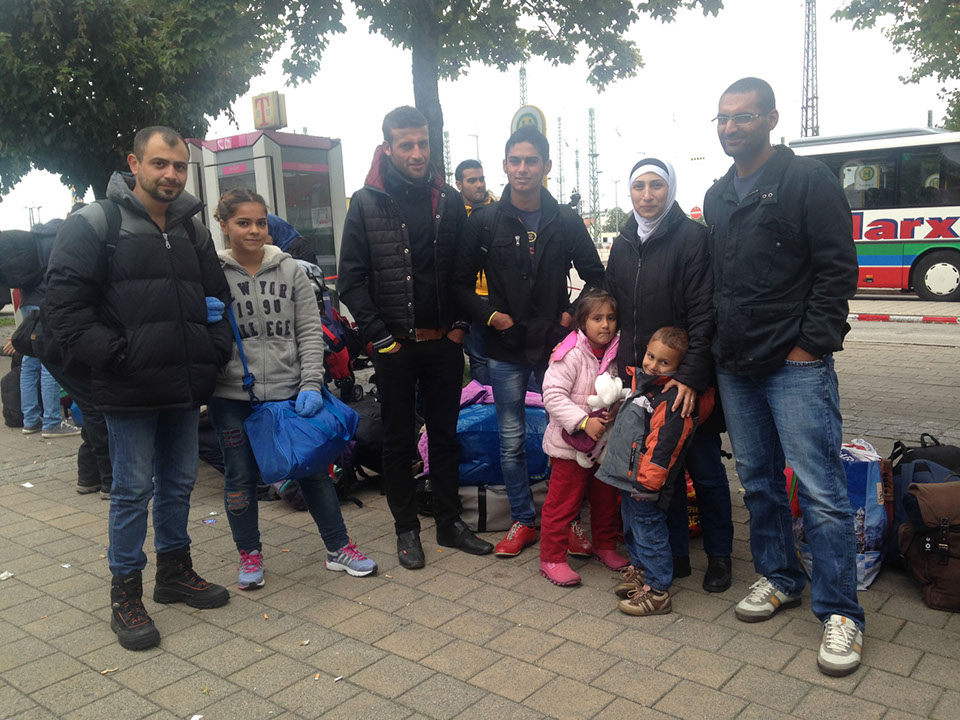
Com os pés em solo alemão, parte do grupo que partiu de Kos faz planos para o futuro. Ghazi (D) sonha em relatar tudo
Half an hour later, I meet them again at the boarding line. Ghazi has a weary look in his eyes. The stubble growing on his face marks the time that has passed since the beginning of his journey through Europe. It's been exactly one week since he left Kos with the dream of getting here.
“I'm tired, but my happiness is greater than the tiredness I feel,” he says.
Ghazi says that while he was in the camp the police took everyone’s fingerprints on a request from Interpol, to check if there were any terrorists in the group. Now that their first permit to remain in Germany has been granted, they will move to a provisional location within the country. They still don't know where they are going: the name of the location is kept confidential. Ghazi asks if there’s a way to find out the location, but the police won't tell. A police officer had told me hours before that they have to keep locations under secrecy to keep refugees from asking to change destinations in case their city is considered less desirable.
Reportagem de ZH se despede de Tala e Mohammad
Despite all the curiosity, Ghazi assures me that he will be happy wherever they send him. He has arrived where he wanted, and he won't have to cross another border. What really matters for him now is not the city, but to see his children enrolled in school and continue his own studies with a doctorate: a wishlist that is both very simple and very complex, revealed at the sidewalk of the train station.
"I want to be a good person. I want to start little by little with my kids, and be a righteous man. I want you to visit me one day, when I have a home,” he invites.
He also plans to learn German. Ghazi is willing to adopt the country that welcomed his family as his own.
“I want to forget about Syria, I'm never going back.”
In the middle of the line, Tala plays with a plush puppy dog that she got as a gift. She puts the toy dog on her back, just like her parents and their friends carried her so many times during the trip. Then, she twirls around with it, as if moving to the sound of music. Mohammad wears a pink beanie and circles his mother's legs with sleepy eyes. Since he left Syria, Ghazi has been trying to keep every moment of the journey in his memory. He has plans to write about the trip as soon as he settles in a new home:
“I will write to my children, so that they can read about this story and remember me when I get old, really old. So that they know that I did all of this for them.”
At 3:00 pm, they get on a red train without knowing its destination. At least this time, they leave with the confidence of someone who has already arrived.
